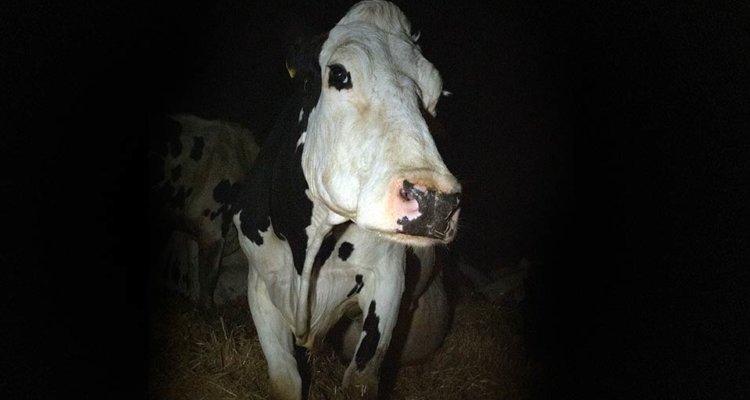The fact that cows in dairy farms usually tend to have miserable lives should be a surprise to no one in this day and age. This knowledge, however, does not take away any of the power of Andrea Arnold’s “Cow,” playing in the Cannes Premiere section of this year’s Festival de Cannes. Five years after premiering “American Honey” in Competition, the director is back on the Croisette with a seemingly simple film that, in fact, brings up interesting and difficult questions regarding the limits between anthropomorphism on-screen and animal rights — or the lack thereof.
READ MORE: Cannes Film Festival 2021 Preview: 25 Films To Watch
Entirely shot at cow level, “Cow” begins just as its main protagonist, a beautiful black-and-white cow named Muna, gives birth to a young calf. Like neon-lit karaoke scenes or one-take dance sequences, graphic animal births now seem an almost mandatory occurrence at all film festivals worthy of the name. But Arnold seems well aware of just how expected that moment is, and she quickly moves on from it — as quickly, in fact, as the farmhands do, soon separating the mother from her young child. Birth here isn’t the beautiful apotheosis of months of pain and hours of effort from an exhausted mother, the way it is often portrayed for human beings. Placed at the beginning of what turns out to be a harrowing saga, this coming into the world of a baby cow does not mark the end but the beginning of suffering.
READ MORE: Summer 2021 Preview: Over 50 Movies To Watch
Early on in the film, as the young calf gets their ear pierced with a label, one may still be able to look at that act as one of necessary and only momentary pain, especially if the viewer has ever been to an actual farm and seen the practices that are today an almost “natural” part of that world. But in showing all the seemingly banal and accepted practices inherent to dairy farming and cattle rearing as they happen on an individual cow level rather than in the cow pen at large, from the perspectives of both the mother and her young calf, Arnold makes their nature as violent impositions evident and unavoidable.
READ MORE: The 100 Most Anticipated Films Of 2021
This is where accusations of anthropomorphism would usually come in. Another film might have used judicious editing to manufacture reactions of despair from its bovine protagonists. Arnold, however, stays so close to the mother and daughter that it soon becomes clear there are no montage tricks at play here. The camera frequently pans up, down, right, or left in time with the cows’ heads to show us what they see: the young calf being taken away, a human being in the distance (never a good sign), or even, in one particularly moving scene, the stars in the night sky. The mother’s repeated moo-s when first separated from her child is further undeniable proof of both basic maternal instinct and pain, as is the young calf’s irrepressible search for an udder to suck on, and its unmistakable anger at the inanimate plastic feeder hung in its small enclosure.
READ MORE: The 25 Best Films Of 2020 You Didn’t See
At the end of the day, however, the inarguable facts alone speak for themselves: a calf is born, immediately separated from its mother, isolated, fed, sold, its horns cauterized with heat, and before long, it is turned into the milk and baby machine that its mother already was before. The brief moments of stress-free grazing in fields are brief, and they always come to an end. No matter which way one looks at it — whether at cow-level or not — the lives of these animals are not happy ones. Therefore, the ethical question that remains isn’t about whether these animals are being treated well or not, but simply about what we are willing to live with. [B+]
Follow along with our full Cannes 2021 coverage here.

